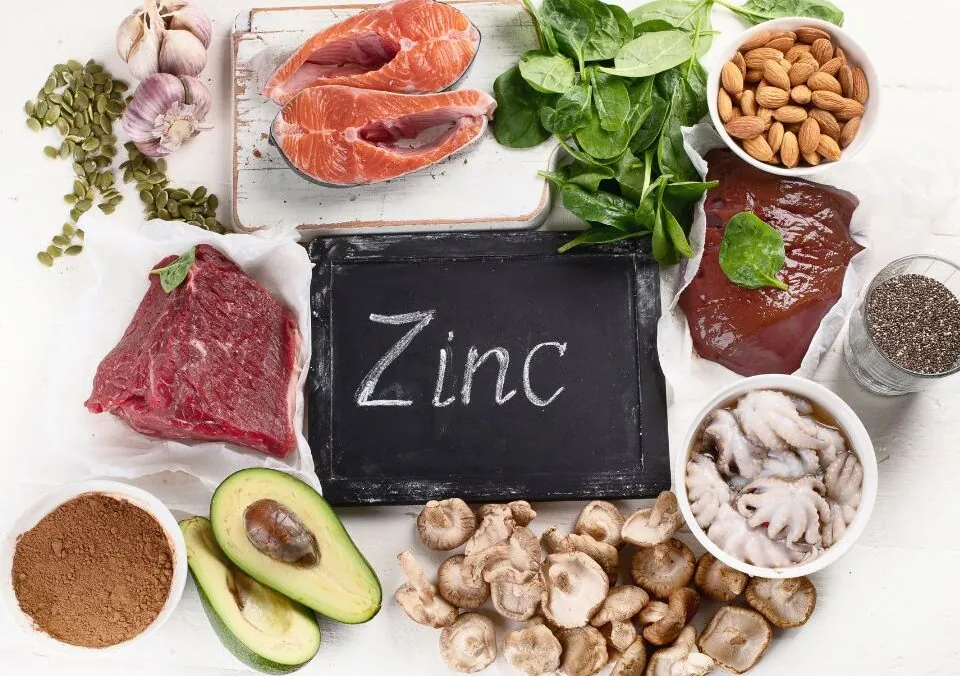Blog
Zinc is Essential for Overall Health

It has always amazed me just how important vitamins and minerals are to our health. Among these, zinc stands out as a crucial trace mineral, integral to numerous bodily functions. The significance of zinc cannot be overstated; it is vital for maintaining overall health, and luckily, it is also relatively easy to obtain through a balanced diet.
According to registered dietician Abigail Basson, zinc plays a key role in various physiological processes within the human body. Some of the notable health benefits that zinc offers include:
- Immune Support: Zinc is essential for the development and function of immune cells. It helps the body fight off invading bacteria and viruses. Studies have shown that zinc supplementation can reduce the duration of the common cold and improve immune response.
- Reduced Inflammation: Chronic inflammation is linked to many diseases, including heart disease and cancer. Zinc has anti-inflammatory properties that help manage the body’s inflammatory response. Research also indicates that adequate zinc intake may reduce markers of inflammation in the body, according to findings published by the National Institutes of Health.
- Boosts Bone Strength: Zinc is necessary for bone formation and mineralization, making it essential for maintaining bone health. Studies suggest that zinc deficiency may lead to weaker bone density and an increased risk of osteoporosis.
- Is Important for Reproductive Health: Zinc plays a critical role in reproductive health for both men and women. In men, zinc supports testosterone production and sperm health. For women, zinc contributes to fertility and overall hormonal balance.
- Helps with Smelling and Tasting: Zinc is key to the proper functioning of taste and smell. A deficiency in zinc can lead to a diminished sense of taste (hypogeusia) and smell (hyp anosmia). The American Journal of Clinical Nutrition outlines how zinc deficiencies can affect sensory perception.
- Boosts Brain Health: Zinc is essential for brain function and is involved in neurogenesis and synaptic plasticity. Research indicates that zinc plays a role in cognitive function and may help in protecting against age-related cognitive decline.
- Aids in Wound Healing: Zinc is vital for skin integrity and structure. It is involved in the synthesis of collagen and has a role in the inflammatory response, making it crucial for wound healing. Studies have indicated that topical and oral zinc can speed up the healing process.
- Benefits Skin Health: Zinc exhibits antioxidant properties that can benefit skin health by combating free radical damage. It can also help control acne and skin inflammation.
- Promotes Eyesight: Zinc is found in high concentrations in the eye, particularly in the retina. It helps maintain the health of the retina and may prevent age-related macular degeneration (AMD). For more information on zinc’s role in eye health, refer to the American Optometric Association.
- Promotes Heart Health: Adequate zinc levels contribute to heart health by helping to regulate blood pressure and reducing LDL cholesterol levels. The American Heart Association provides numerous articles on the impact of zinc on cardiovascular health.
- Is Crucial for Growth and Development: Zinc is particularly important during periods of rapid growth—like childhood, adolescence, and pregnancy. It supports cell division and growth, making it essential for infants and children. The World Health Organization highlights the importance of zinc in growth and development.
- Balances Blood Sugar: Zinc plays a role in insulin metabolism and may help manage blood sugar levels. Some studies suggest a link between zinc deficiency and an increased risk of type 2 diabetes.

Dietary Sources of Zinc
Getting enough zinc is relatively straightforward, especially if you consume a well-rounded diet. Some foods that are particularly high in zinc include:
- Meat: Beef, pork, and lamb are excellent sources. In fact, red meat is one of the richest sources of zinc, as highlighted by the USDA.
- Poultry: Chicken and turkey also provide a good amount of zinc, making them versatile options for a healthy diet.
- Seafood: Shellfish, especially oysters, are loaded with zinc and are significantly higher in zinc per serving compared to other foods. The Mayo Clinic provides insights into the benefits of seafood.
- Dairy Products: Cheese and yogurt are not only good sources of zinc but also offer calcium and other essential nutrients.
- Legumes: Beans, lentils, and chickpeas contain zinc but may have phytates that can inhibit its absorption. Soaking and sprouting can help increase zinc bioavailability.
- Nuts and Seeds: Pumpkin seeds, cashews, and hemp seeds are healthy sources of zinc. Eating a handful of nuts as a snack can help increase your zinc intake.
- Whole Grains: Oats, quinoa, and whole wheat products contain zinc, though, similar to legumes, they also include phytates that might affect absorption.
Local Sourcing of Zinc-Rich Foods
Did you know that Arizona agriculture produces many zinc-rich foods listed above? This is a significant benefit for those who want to incorporate fresh, local produce into their diet. Local farmers’ markets and community-supported agriculture (CSA) programs are great avenues through which you can access these foods.
For more information and resources on where to find locally produced food products, you can visit the Fill Your Plate website. This platform provides information on local farmers, how to eat seasonally, and tips on preparing healthy meals using fresh, local ingredients.
Conclusion
Zinc is undoubtedly a powerhouse mineral, essential for numerous aspects of health and wellbeing. Its wide-ranging benefits—from immune support to promoting heart health—highlight the importance of including zinc-rich foods in our diets. With its abundance in various meats, seafood, legumes, and dairy products, obtaining enough zinc is typically not a challenge, especially when focused on a balanced diet.
For anyone looking to enhance their health and wellbeing, understanding the role of zinc and actively incorporating it into daily nutrition is a wise and beneficial choice. Making informed decisions about diet can significantly influence health, vitality, and overall quality of life. Remember, a balanced diet coupled with an awareness of nutrient benefits can pave the way to better health outcomes in the long run.
So, whether you’re at your local grocery store or visiting a farmer’s market, keep an eye out for these zinc-rich foods. Your health will thank you!
By Heide Kennedy, Arizona Farm Bureau Communications Intern


















